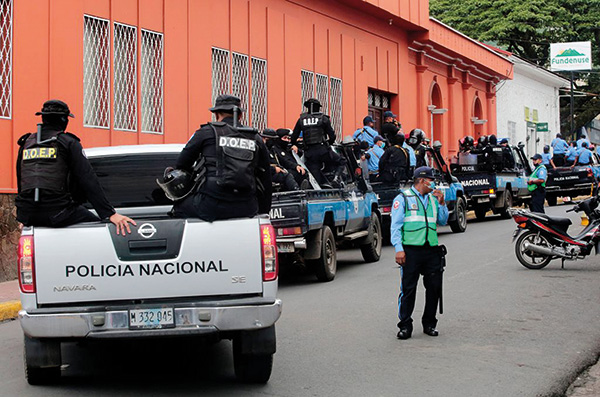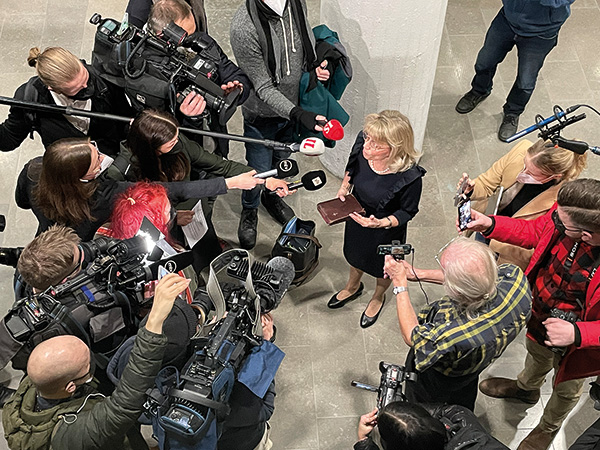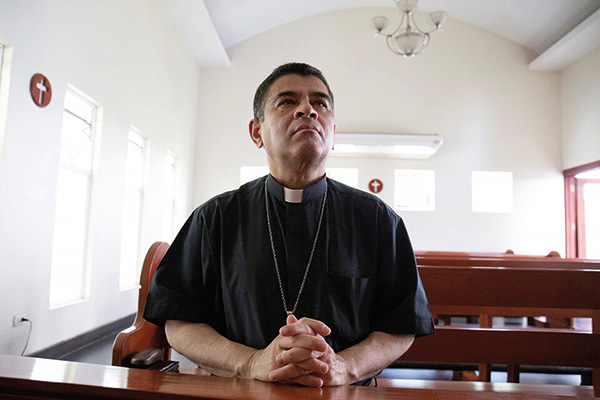Subtotal: $
Checkout-

Readers Respond
-

Sister Penelope in Expectation
-

The Most Valuable Joads
-

Timber Framing with Teenagers
-

Iron Sharpens Iron
-

Educating for Freedom
-

Why I Became a Firefighter
-

Does Teaching Literature and Writing Have a Future?
-

Schools for Philosopher-Carpenters
-

Deerassic Park
-

Why We’re Failing to Pass on Christianity
-

For the Love of Public School Teaching
-

Let Children Play
-

Reverence for the Child
-

Felix Manz: The Making of a Young Radical
-

How Math Makes You a Better Person
-

Should I Read Scary Fairy Tales to My Child?
-

Lernvergnügenstag: A Day for the Joy of Learning

Freedom of Speech Under Threat
From Nicaragua to Finland, bold speech is a Christian’s right and duty.
By Paul Coleman and Elyssa Koren
December 27, 2024
Just before dawn on August 19, 2022, police surrounded the home of Bishop Rolando Álvarez, the Catholic prelate of Matagalpa, a city in central Nicaragua. Without obtaining a warrant, they arrested the bishop and seven other members of the Catholic Church. For the fifteen days before his arrest, he had been confined to his house and unable to leave, even to celebrate Mass in the cathedral just down the road.
The charges that the government brought against the bishop were serious. They accused him of undermining national integrity, spreading false news, and being a traitor to the state. As evidence, they cited critical remarks Álvarez had made in his sermons against repression under the regime of Nicaragua’s president, Daniel Ortega. The bishop had preached openly on the God-given dignity of the human person, challenging violations of that dignity inflicted against the Nicaraguan people by their government.

Riot police patrol outside Matagalpa’s Curia preventing Bishop Rolando Álvarez from leaving, August 2022. Photo by STR/AFP via Getty Images. Used by permission.
Bishop Álvarez’s criticism was well founded. Following a peaceful protest in 2018, Ortega’s government cracked down on dissenters, killing three hundred people, injuring thousands, and imprisoning hundreds without charge. Since then, it has systematically targeted the Catholic Church, going after its clergy, nuns, schools, and media outlets. Unafraid to preach truth from the pulpit in the face of mounting repression, Álvarez emerged as a spiritual leader for those suffering under a government intent on silencing dissent. His rebukes were rooted in his faith: “These circles of power sometimes think that they are the ones in charge, that they are the ones who decide over the people.… Our dignity and our inner freedom come from God, who has made us in his image and likeness, and from his Son, who has redeemed us, and no one can take that away from us.”
Such benevolent yet pointed words of truth positioned Bishop Álvarez as public enemy number one in the eyes of the regime. Following a hurried, sham trial in February 2023, he was sentenced to twenty-six years in prison, of which he ended up serving eleven months.
What is transpiring in Nicaragua follows a familiar pattern: authoritarian powers cannot tolerate the proclamation of the truth that there is a higher authority. Because of this, they rely on censorship to consolidate control. Clearly, freedom of speech is an essential antidote to totalitarianism, and particularly essential for the Christian, because the proclamation of the good news demands our speech. Without the ability to speak freely, we cannot share the hope of the gospel. Followers of Christ have a duty to bring the gospel to the world, and like all people, they also have a right to speak and live by their convictions. Put in practical terms, without free speech it is impossible to engage with others on points of dispute that are important not only to Christians, but also to the whole society. Addressing key issues of our time depends on our ability to speak truth boldly and openly in a world where many do not know who made them and why.
In a free society, every person has the right to peacefully communicate his or her beliefs and should extend a reciprocal respect for others by tolerating peaceful disagreement. This lays the groundwork for a culture of robust dialogue, vital for the safeguarding of democracy and the peaceful coexistence of diverse viewpoints. International law enshrines these core precepts, asserting that the right to free speech is a broadly protected human right, and essential for the realization of other human rights.
The Christian faith is predicated on core tenets of dignity and justice, fundamentally at odds with the dehumanization and repression that characterize oppressive regimes. Despotic governments will seek to quash, co-opt, or manipulate the church as long as it offers a vision of humanity at odds with tyranny.

Päivi Räsänen speaks to reporters after submitting her defense to the Finnish Supreme Court in Helsinki, Finland, in 2019. Photograph courtesy of ADF International.
Religious institutions, such as the Catholic Church in Nicaragua, also hold significant temporal influence over believers, which governments seeking to consolidate total control may perceive as a threat, insofar as believers follow the dictates of their faith and the teachings of their religious leaders. Even more importantly, religious adherents cast their eyes on God for ultimate authority, and while this is not necessarily at odds with righteous earthly authority, it creates a fundamental incompatibility between Christians and a tyrannical state.
Christian teachings often conflict with the secular ideologies of the state. If a government attempts to use its authority to push particular contemporary ideologies, it will likely find itself in opposition to Christianity, which holds an immutable view of truth and morality that cannot accommodate agendas based on falsehood. The state also may seek to promote a homogenous identity, rejecting the spread of Christianity where a different national religion or ideology already exists.
The call to action for everyone, and in particular today’s Christians, is to vigilantly defend the freedom to speak and live out our convictions wherever we find ourselves. Of course, censorship looks different in different countries. Where Christians are the minority, the consequences are generally severe, potentially even life-threatening. The silencing power of the state is softer in Western countries. But what unites opponents of Christianity the world over is a desire to suppress the faith in order to consolidate control.
In June of 2019, Päivi Räsänen, a member of Finland’s parliament, a medical doctor, and a devoted grandmother, took to social media to post a Bible passage, Romans 1:24–27, challenging her church’s decision to participate in a Helsinki Pride event. “I wanted to exercise my basic right to free speech,” Räsänen said, “to publicly ask how they reconciled their activities with biblical teaching.”
Her post drew the ire of the Finnish authorities. In the following days, she faced hours of police investigations and two criminal trials. She is currently preparing to head to the Supreme Court of Finland in defense of the basic human right to speak freely as a Christian.
Her trials were peppered with theological questions, delving into the ins and outs of scriptural interpretation. At one point, the state prosecutor vigorously questioned whether it was really possible to separate the sin from the sinner – a fundamental tenet of the Christian faith, and hardly the business of the state.
“I couldn’t believe I was sitting in a courtroom where the prosecution discussed the interpretation of Bible verses,” Räsänen noted. Fortunately, reason prevailed, with a unanimous acquittal at the lower court, which held that “it is not for the district court to interpret biblical concepts.” Räsänen was again unanimously acquitted on appeal, but as the case looms before the Supreme Court, the fact remains that this is happening in the “free” world. Even if she is spared a guilty verdict, Räsänen’s prosecution sends an unmistakable message: dare to share views that go against the orthodoxies of the day, and you may find yourself tried as a criminal. Christian beliefs, whether posted or simply thought, represent an existential threat to those who seek to assert power and control through authoritarian overreach.
More often than not, the task at hand for today’s Christian is simply to speak the truth. As stated by Aleksandr Solzhenitsyn, who endured years of Soviet persecution: “The simple step of a courageous individual is not to take part in the lie. One word of truth outweighs the world.” We should champion freedom of speech with courage, knowing that in doing so we help create a world where all can experience the life-giving power of the gospel. Now is the time to defend the right of every person to live and speak the truth. Scripture reminds us of the power of truth and the necessity of speaking it boldly: “For we cannot do anything against the truth, but only for the truth” (2 Cor. 13:8).

Bishop Rolando Álvarez. Photograph by Maynor Valenzuela, Reuters / OSV News. Used by permission.
Even in an age of shuttered freedoms and oppressive ideologies, Christians in particular must continue to articulate a positive vision for humanity, a vision of a world where every person is cherished and fundamental freedoms are upheld. This is the vision laid out in the gospels. It is the good news that brings life to all who hear it. The Christian message, shared freely and openly, has the power to transform societies into places of peace and flourishing.
On January 15, 2024, Bishop Álvarez was freed as a result of international pressure. While fortunate that he was spared over two decades of imprisonment, he now lives in exile in the Vatican and is unable to live freely as a Catholic prelate in Nicaragua. For the time being, he remains banished from his homeland, and the Catholic faithful of Nicaragua are deprived of his spiritual leadership. Despite this, he has offered a steadfast witness of Christian hope: “We have to respond to hate with love, despair with hope, and fear with the strength and courage given to us by the glorious and resurrected Christ.”
As Bishop Álvarez’s message exemplifies, Christians are ultimately defined by where we put our hope: not in this world but in Christ. Together with the many who follow Christ in places of extreme persecution, we keep our sights on the long game – vigilantly and joyfully championing the right to live and speak the truth so that all may have the chance to encounter the eternal saving power of the gospel.
Already a subscriber? Sign in
Try 3 months of unlimited access. Start your FREE TRIAL today. Cancel anytime.





























